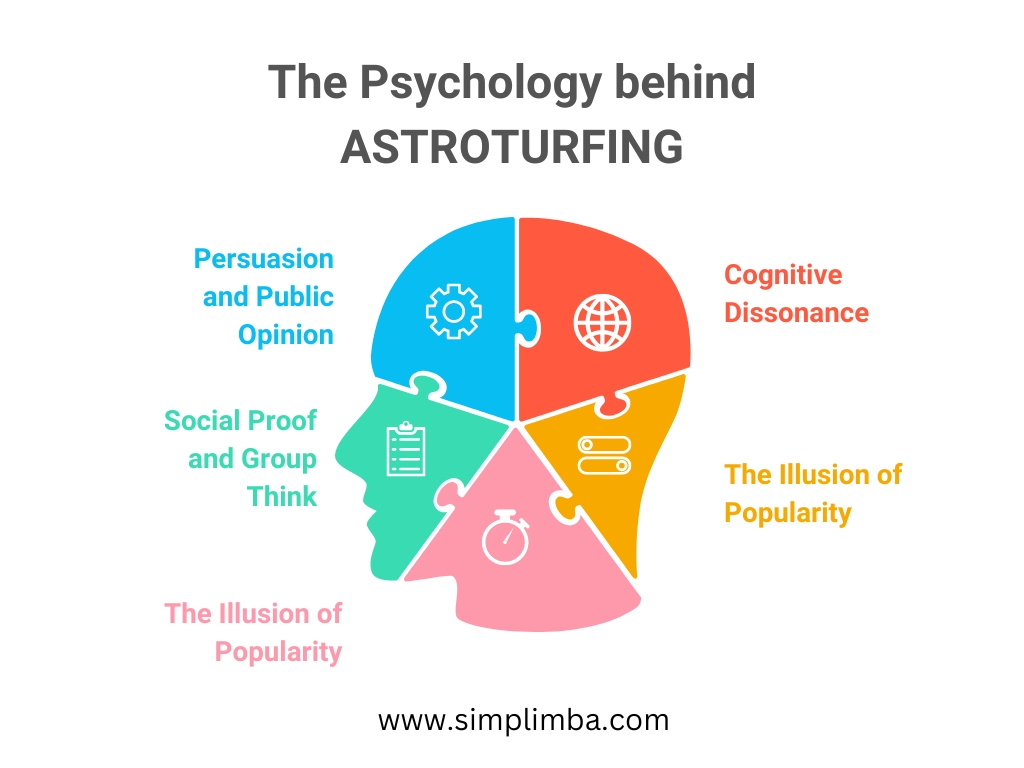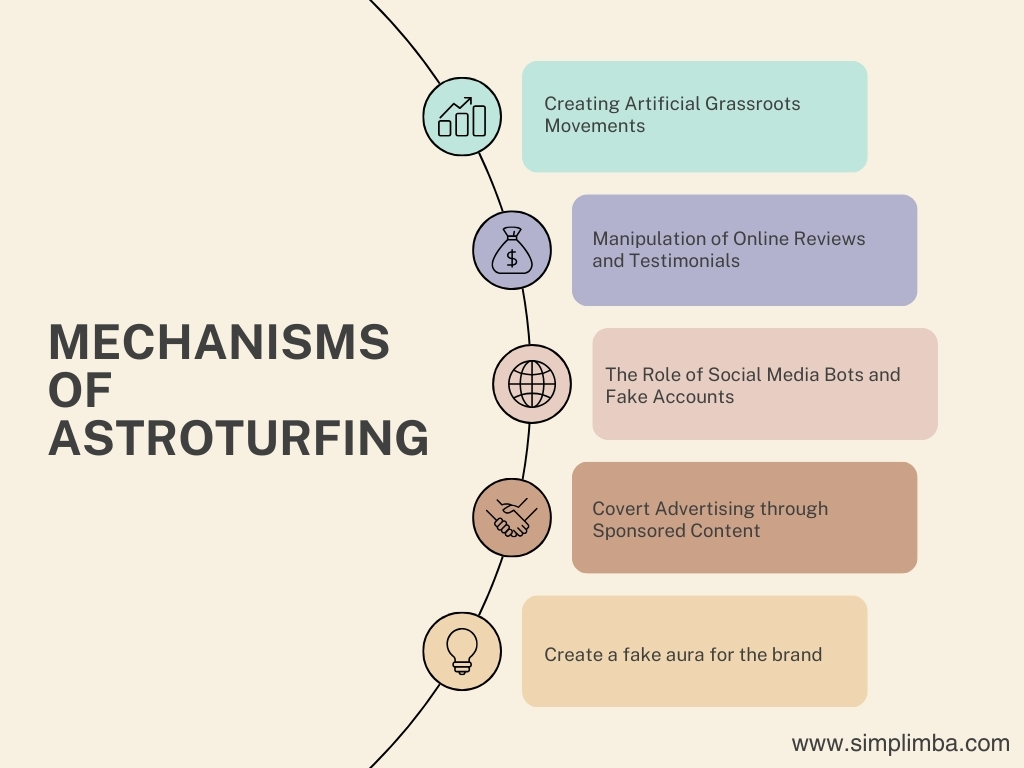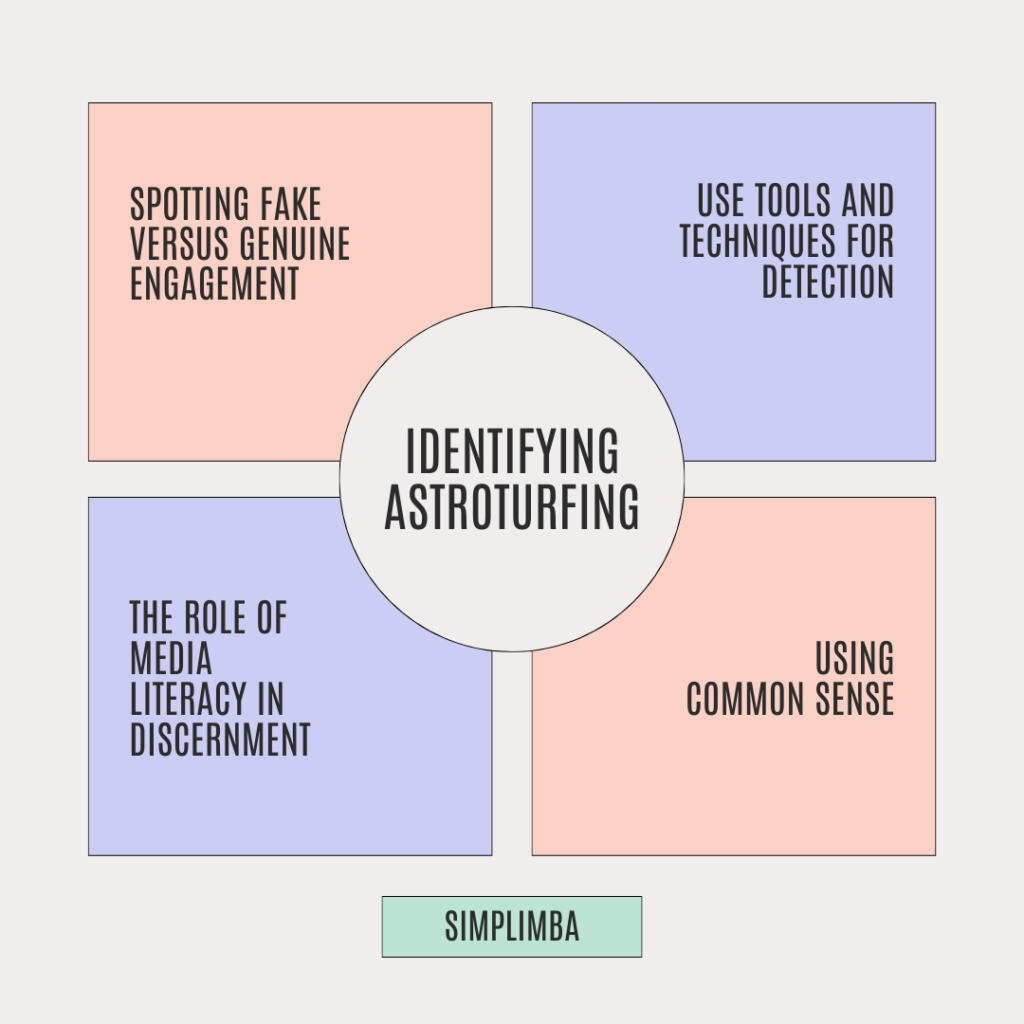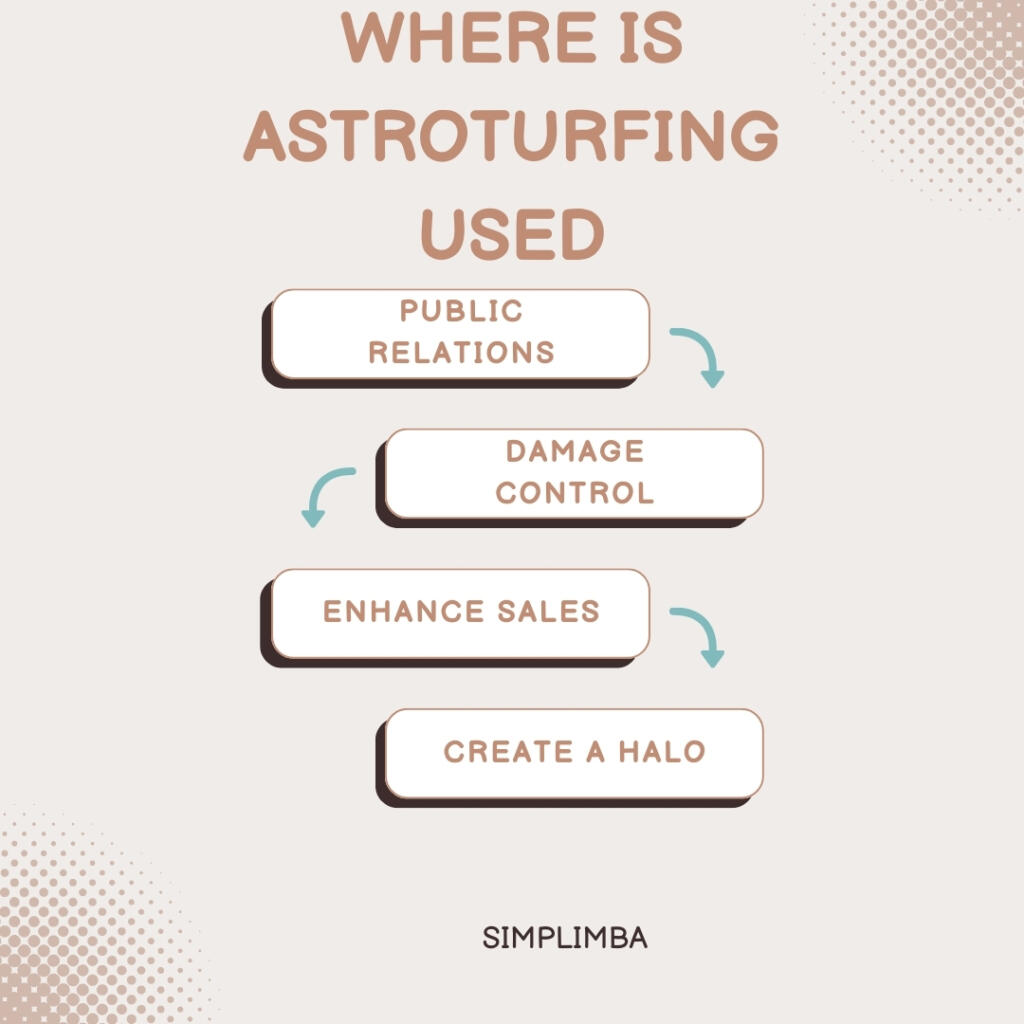It’s imperative for businesses to understand the various marketing strategies and tactics that can impact consumer perceptions and buying decisions. One such technique that often blurs the lines between authentic consumer opinions and manufactured endorsements is astroturfing. Astroturfing in marketing is a deceptive practice where organizations create the illusion of grassroots support or genuine interest in a product, service, or idea.
Through astroturfing, businesses and individuals aim to manipulate public opinion by generating fake reviews, comments, or social media posts that appear to be from unbiased sources. This strategy is designed to sway consumer perceptions, create a buzz around a product or service, and ultimately drive sales. However, astroturfing can erode consumer trust and have negative repercussions on a brand’s reputation if discovered.
As astroturfing becomes more prevalent in the digital age, consumers must be vigilant and discerning when navigating the vast landscape of online information and reviews. By understanding what astroturfing is and how it operates in the marketing world, businesses can make more informed decisions about their advertising strategies and build authentic relationships with their target audience based on trust and transparency.

Astroturfing in Marketing
The Psychology Behind Astroturfing

Even though astroturfing may seem like a clever marketing strategy at first glance, it is necessary to understand the psychology behind it to grasp its potential negative impact. According to What is astroturfing, and why your business should avoid it, astroturfing involves creating fake grassroots movements to manipulate public opinion and create a false sense of consensus. This tactic can erode trust and credibility, leading to long-term damage to a brand’s reputation.
Persuasion and Public Opinion
Psychology plays a crucial role in astroturfing by leveraging persuasion techniques to sway public opinion. By presenting fake reviews, testimonials, or endorsements, astroturfing aims to influence consumer behavior and create a sense of popularity around a product or service. This manipulation of social proof can deceive consumers into making purchasing decisions based on false information, ultimately leading to disillusionment and distrust.
Social Proof and Group Think
Social proof is a powerful psychological phenomenon that influences individuals to conform to the actions of others in a group. Astroturfing exploits this tendency by creating artificial consensus and manipulating perceptions of what is popular or desirable. This can lead to a snowball effect where individuals are more likely to adopt the same behavior or beliefs as others, further reinforcing the false narrative created by astroturfing campaigns.
The Illusion of Popularity
Astroturfing creates a false sense of popularity around a product, service, or idea. The perceived popularity can influence potential customers, as people are generally more inclined to choose products that others seem to prefer.
Peer Reviews and Emotional Appealing
People are more likely to trust reviews from their peers as opposed to company advertising. Astroturfing exploits this by posing as unbiased consumers sharing positive experiences or opinions. Astroturfing exploits emotions to influence consumers’ decisions, often utilizing emotional language to elicit positive feelings towards their product or brand.
Cognitive Dissonance
Astroturfing can also play on cognitive dissonance, where a person experiences discomfort due to holding two contradictory beliefs simultaneously. For instance, a potential customer may have reservations about a product, but seeing positive reviews from peers can resolve this conflict in favor of buying the product.
The Mechanisms of Astroturfing in Marketing

Creating Artificial Grassroots Movements
Astroturfing in marketing involves the creation of artificial grassroots movements that give the illusion of widespread support or interest in a product or service. This manipulation tactic often involves paying individuals or organizations to promote a brand or idea as though it is coming from a genuine, grassroots level. By fabricating support from seemingly independent sources, companies can generate buzz and credibility around their offerings.
These artificial grassroots movements can take the form of orchestrated protests, sponsored events, or campaigns that appear to be driven by passionate individuals but are, in reality, carefully crafted by marketing teams. By leveraging social proof and the power of influencer marketing, astroturfing can manipulate public perception and shape consumer behavior.
Marketers must tread carefully when engaging in astroturfing tactics, as the exposure of these manufactured movements can lead to backlash and a loss of trust from consumers. It is vital to prioritize authenticity and transparency in marketing efforts to build long-term relationships with customers.
Manipulation of Online Reviews and Testimonials
For businesses looking to boost their online reputation, manipulating online reviews and testimonials can be a tempting shortcut. Astroturfing in the form of fake reviews or testimonials involves creating false accounts or paying individuals to post positive feedback about a product or service. This deceptive practice aims to sway potential customers’ perceptions and influence their purchasing decisions.
The Role of Social Media Bots and Fake Accounts
For companies seeking to amplify their online presence and engagement, the use of social media bots and fake accounts has become a common astroturfing strategy. These automated accounts can generate likes, shares, and comments on posts to create the illusion of organic interaction and popularity. By artificially inflating metrics such as follower counts and engagement rates, businesses can appear more influential and reputable to consumers.
Another vital aspect of astroturfing is the creation of fake accounts that mimic real users to spread promotional content and influence online conversations. These accounts often operate covertly, blending in with genuine users to avoid detection. By manipulating online discussions and steering narratives, companies can shape public perception and control the online discourse surrounding their brand.
Covert Advertising through Sponsored Content
Creating sponsored content that subtly promotes a product or service is another form of astroturfing that has gained popularity in the digital age. By partnering with influencers or content creators to endorse a brand within their posts, companies can reach a broader audience in a seemingly authentic way. This covert advertising allows businesses to bypass traditional forms of advertising and connect with consumers more organically.
This practice blurs the lines between genuine recommendations and paid promotions, making it challenging for consumers to discern when they are being marketed. With the rise of influencer culture and sponsored posts on social media, companies must be transparent about their partnerships and ensure that sponsored content is disclosed to maintain trust with their audience.
The History of Astroturfing
Astroturfing, named after AstroTurf, a brand of synthetic carpet designed to resemble natural grass, is a form of advocacy usually in favor of a political or corporate agenda designed to appear as though it originates from and is supported by grassroots participants. It is a practice intended to give the statements or organizations credibility by withholding information about the source’s financial connection.
Early Instances: Astroturfing traces its roots back to the early part of the 20th century, particularly in the realm of corporate communications. The term itself was coined in the 1980s by U.S. Senator Lloyd Bentsen of Texas. He used it to describe a “mountain of cards and letters” he received advocating for the insurance industry’s position on certain legislation. These communications were not from concerned citizens, but from insurance companies themselves, thus giving the appearance of grassroots support where there was none.
Evolution Through the Decades: Over the decades, astroturfing evolved from simple mail campaigns to more complex operations involving advertisements, public relations firms, and large amounts of money. The 1990s and early 2000s saw the rise of astroturfing in the political domain, with various organizations using it to influence public policy and election campaigns.
Legal and Ethical Considerations
Laws Regulating Astroturfing
Many countries have laws that regulate deceptive marketing practices, including astroturfing. Astroturfing can be considered illegal under false advertising laws, as it involves creating fake endorsements or testimonials to deceive consumers. In the United States, the Federal Trade Commission (FTC) has guidelines that require disclosure of any material connections between an endorser and the product being promoted. Failure to comply with these guidelines can result in fines and legal consequences for businesses engaged in astroturfing.
Laws governing astroturfing vary by country, but the overarching principle is to protect consumers from being misled by false information. Companies need to be transparent about their marketing tactics to ensure ethical practices and maintain trust with their customers. Businesses need to familiarize themselves with the laws and regulations surrounding astroturfing in their respective jurisdictions to avoid potential legal issues.
Businesses that engage in astroturfing not only risk facing legal repercussions but also damage to their reputation and credibility. Consumers value authenticity and honesty in marketing efforts, and any form of deception can harm a brand’s image. By adhering to the laws and regulations set forth to prevent astroturfing, companies can build trust with their audience and maintain a positive brand image.
Ethical Implications in Marketing Practices
For marketing professionals, ethical considerations are crucial when developing campaigns to ensure they are honest, transparent, and respectful to consumers. Astroturfing raises ethical concerns due to its deceptive nature, which can lead to a breach of trust between businesses and their customers. Engaging in astroturfing practices undermines the principles of fair competition and consumer rights, which are vital for maintaining a healthy marketplace.
Marketers must prioritize honesty and integrity in their strategies to uphold ethical standards and cultivate long-lasting relationships with customers. Transparency in marketing communications is key to building trust and loyalty among consumers. By opting for genuine, authentic approaches to engagement, businesses can establish a strong reputation and distinguish themselves as trustworthy brands in the market.
Plus, companies that prioritize ethical considerations in their marketing practices are more likely to resonate with modern consumers who value transparency and authenticity. By aligning their values with those of their target audience, businesses can establish a competitive edge based on credibility and trust. Ethical marketing not only benefits the brand but also contributes to a more ethical business environment overall.
Transparency and Consumer Rights
One of the key aspects in combating astroturfing is promoting transparency and upholding consumer rights. Transparency in marketing involves providing accurate information about products or services, including the sources of endorsements or reviews. Consumers have the right to make informed decisions based on truthful and reliable information, and businesses have a responsibility to deliver on this front.
Understanding the importance of transparency and consumer rights is vital for businesses to maintain a positive reputation and build trust with their audience. By being transparent about their marketing practices and ensuring compliance with regulations, companies can demonstrate their commitment to ethical conduct and respect for consumer rights. Upholding transparency not only fosters consumer trust but also contributes to a more ethical marketing landscape overall.
Identifying Astroturfing

Spotting Fake versus Genuine Engagement
Not all online engagement is created equal. Astroturfing involves creating the illusion of grassroots support or genuine interest in a product, service, or idea. To spot fake from genuine engagement, look for patterns such as unusually high positive reviews or comments on a particular topic, especially if they lack depth or detail. Genuine engagement tends to be more varied in sentiment and may include constructive criticism or detailed personal experiences.
Moreover, astroturfing often involves a sudden surge in activity on a platform, with multiple accounts posting similar content simultaneously. Genuine engagement, on the other hand, tends to grow organically over time and may come from a diverse range of users with varying levels of influence.
By analyzing the quality, consistency, and timing of engagement, marketers can more effectively identify astroturfing campaigns and differentiate them from genuine interactions with their audience.
Tools and Techniques for Detection
Genuine engagement is crucial for building trust and credibility with your audience. Hence, it is vital to use tools and techniques to detect astroturfing. One common tool is social media monitoring software, which can help track trends and identify suspicious patterns in engagement. Additionally, sentiment analysis tools can assess the authenticity of comments by analyzing the language and emotional tone used.
Techniques like cross-referencing data from multiple sources and conducting thorough audits of engagement metrics can also help in detecting astroturfing. Furthermore, verifying the identities of seemingly enthusiastic users through background checks or IP address tracking can reveal any inconsistencies and flag potential instances of astroturfing.
Having a robust system in place to monitor and detect astroturfing not only protects your brand from deceptive practices but also fosters genuine connections with your audience, leading to more meaningful and sustainable relationships in the long run.
Genuine engagement is the cornerstone of successful marketing strategies. Detecting and preventing astroturfing ensures that your brand’s reputation remains intact and that your audience can trust the authenticity of your online presence. By staying vigilant and utilizing the right tools and techniques, marketers can effectively combat astroturfing and cultivate genuine relationships with their audience.
The Role of Media Literacy in Discernment
Media literacy plays a vital role in helping individuals discern between authentic interactions and astroturfing efforts. An informed audience is more equipped to critically analyze content, identify manipulation tactics, and question the credibility of information presented online. By educating consumers on how to spot astroturfing techniques, we empower them to make informed decisions and resist deceptive marketing practices.
Astroturfing and Public Relations

Strategy and Execution in PR Campaigns
Now, let’s research the world of public relations (PR) and how astroturfing plays a role in shaping public perception. To effectively execute astroturfing in PR campaigns, strategists often create fake grassroots movements or initiatives to appear as if they are coming from genuine, concerned citizens. This involves crafting a narrative that aligns with the client’s goals and using various online platforms and social media channels to amplify the message.
Moreover, astroturfing in PR campaigns requires careful planning and coordination to ensure that the fabricated support appears organic and widespread. This may involve creating fake accounts, generating positive comments or reviews, and utilizing influencers or celebrities to endorse the message. The goal is to sway public opinion and shape the conversation in favor of the client while disguising the true source of the messaging.
To maintain the illusion of authenticity, astroturfing in PR campaigns often involves continuous monitoring and adjustment of strategies based on the audience’s response. PR professionals may need to adapt their tactics quickly to counter any suspicions or negative feedback that could potentially unravel the astroturfing efforts and harm the client’s reputation.
Reputation Management and Damage Control
Public relations also play a crucial role in reputation management and damage control when astroturfing tactics are exposed. In such situations, PR teams must swiftly address the allegations of deception and work to rebuild trust with the public. This can involve issuing apologies, clarifying misinformation, and taking steps to prevent similar incidents in the future.
Control over the narrative is vital in reputation management, as any misstep can further damage the client’s credibility and tarnish their image. PR professionals must be proactive in managing crises, engaging with stakeholders transparently, and demonstrating a commitment to ethical practices to regain public trust.
Control over the narrative is vital in reputation management, as any misstep can further damage the client’s credibility and tarnish their image. PR professionals must be proactive in managing crises, engaging with stakeholders transparently, and demonstrating a commitment to ethical practices to regain public trust.
Digital Marketing and Astroturfing
All digital marketers must be aware of the practice of astroturfing, which involves creating fake grassroots campaigns to deceive consumers. As discussed in Astroturfing on Social Media: A Quick Introduction, this tactic can be particularly prevalent on social media platforms where authenticity is highly valued. Understanding how astroturfing operates in digital marketing is crucial to maintaining ethical standards and building trust with your audience.
SEO and the Implications of Astroturfing
To research into the implications of astroturfing in SEO, it is imperative to recognize that search engines prioritize genuine content and user engagement. Astroturfing can lead to artificially inflated rankings through fake reviews, comments, and backlinks, ultimately deceiving both search algorithms and users. This deceptive practice not only compromises the credibility of the brand but can also result in penalties from search engines, impacting organic visibility in the long run.
Content Marketing and the Risks of Deceptive Practices
One of the key pillars of digital marketing is content creation, and astroturfing poses significant risks in this domain. Falsely generating buzz around a product or service through fabricated testimonials, sponsored posts, or influencer collaborations can mislead consumers and erode trust in the brand. Moreover, unethical content marketing practices undermine the authenticity and integrity of the marketing efforts, leading to potential backlash and tarnishing the brand’s reputation.
Practices involving astroturfing not only jeopardize the ethical foundation of digital marketing efforts but also violate consumer trust. It is crucial for marketers to uphold transparency and honesty in their campaigns to foster genuine connections with their audience and build long-term relationships based on trust and credibility.
The Impact of Astroturfing on Social Media Marketing
Astroturfing on social media platforms can have far-reaching consequences for brands and marketers. The manipulation of user-generated content, such as fake reviews and endorsements, can mislead consumers and distort perceptions of a product or service. This deceitful practice not only violates the terms of service of social media platforms but also undermines the authenticity and reliability of digital marketing efforts.
Astroturfing can have a detrimental impact on the effectiveness of social media marketing strategies, leading to increased skepticism among consumers and damaging the reputation of the brand. Marketers must prioritize genuine engagement and authentic interactions with their audience to build credibility and loyalty in the competitive digital landscape. By avoiding deceptive practices like astroturfing, brands can establish trust and foster meaningful connections with their target market.
Countermeasures and Best Practices
Industry Measures Against Astroturfing
Your company can implement various industry measures to combat astroturfing in marketing. One effective approach is to establish clear guidelines and policies regarding fake reviews and deceptive practices. By promoting transparency and authenticity, companies can foster trust with their customers and discourage unethical behavior. Additionally, collaborating with industry organizations and regulatory bodies can help set industry standards and enforce consequences for astroturfing activities.
Industry-wide initiatives, such as launching awareness campaigns and sharing best practices, can also be valuable in raising awareness about the negative impacts of astroturfing. Moreover, investing in advanced technologies like AI and machine learning algorithms can help identify and flag suspicious activities more effectively. By staying proactive and vigilant, companies can better protect their brand reputation and integrity in the market.
Training employees and partners on the importance of ethical marketing practices and providing clear reporting channels for any suspected astroturfing activities are crucial steps to combatting this issue. By prioritizing integrity and ethical conduct at all levels of the organization, companies can create a culture of transparency and accountability that deters astroturfing attempts.
Developing Authentic Customer Marketing Strategies
Measures should be taken to develop authentic customer marketing strategies that prioritize genuine engagement and relationships. By leveraging real customer testimonials, user-generated content, and influencer partnerships, companies can build credibility and trust with their target audience. Authenticity should be at the core of all marketing efforts, ensuring that customers feel valued and respected.
This approach involves listening to customer feedback, responding to their needs, and incorporating their voices into marketing campaigns. By understanding the preferences and concerns of their audience, companies can tailor their messaging and offerings to align with genuine customer expectations. Authentic marketing strategies not only help combat astroturfing but also drive long-term loyalty and advocacy among customers.
Encouraging Ethical Consumer Engagement
Ethical consumer engagement entails promoting responsible behaviors and educating customers about the importance of ethical marketing practices. Companies can engage with their audience through transparency reports, ethical sourcing initiatives, and cause-related marketing campaigns to showcase their commitment to ethical standards. By encouraging open communication and honesty, companies can foster genuine connections with their customers and deter astroturfing attempts.
Empowering consumers with the knowledge and tools to identify astroturfing activities can also help prevent manipulation and deception. Providing resources on how to spot fake reviews, sponsored content, and inauthentic endorsements can empower consumers to make informed decisions and support companies that prioritize ethical marketing practices. By working together with consumers as partners in ethical engagement, companies can cultivate a community of advocates who champion authenticity and integrity in the marketplace.
Future Perspectives on Astroturfing
To understand the future perspectives of astroturfing in marketing, it is crucial to analyze the current trends and anticipate the upcoming shifts in the industry. Astroturfing, influencers, and sponsored content have become intertwined in the digital marketing landscape. As companies strive to gain a competitive edge and capture the attention of their target audience, the use of astroturfing tactics is likely to evolve in parallel with the changing dynamics of online advertising. For a comprehensive overview of astroturfing practices and their implications in digital marketing, refer to our detailed guide on Astroturfing, Influencers, and Sponsored Content. Oh My!
The Evolving Landscape of Digital Marketing
For businesses operating in the digital sphere, navigating the evolving landscape of digital marketing is necessary to effectively reach and engage with their target audiences. As astroturfing continues to adapt to new technologies and consumer behaviors, marketers must stay ahead of the curve to avoid falling victim to unethical practices. The rise of influencer marketing and the increasing popularity of sponsored content pose both opportunities and challenges for brands looking to leverage these strategies. By understanding the nuances of astroturfing and its role in the broader digital marketing ecosystem, companies can position themselves for success in the competitive online marketplace.
Anticipating New Forms of Astroturfing
The future of astroturfing in marketing is likely to see the emergence of new forms and tactics aimed at deceiving consumers and manipulating online conversations. As technology continues to advance, so too will the tools and strategies used by deceptive actors to mask their true intentions. Companies must be vigilant and proactive in identifying and combating these unethical practices to maintain trust and credibility with their audiences. Anticipating new forms of astroturfing requires a deep understanding of evolving digital marketing trends and a commitment to transparency and authenticity in all marketing efforts.
Forms of astroturfing are constantly evolving to outwit detection methods and exploit vulnerabilities in online platforms. From fake reviews and social media bots to sophisticated deepfake technologies, the landscape of digital marketing is ripe for exploitation by malicious actors. By staying informed and implementing robust monitoring and verification processes, businesses can safeguard their reputations and uphold ethical standards in the face of emerging astroturfing tactics.
Proactive Measures for Transparency and Authenticity
Transparency and authenticity are paramount in today’s digital marketing landscape, where consumer trust is increasingly elusive yet invaluable. By proactively implementing measures to enhance transparency and authenticity in all marketing communications, companies can build stronger relationships with their audiences and differentiate themselves from less ethical competitors. Leveraging tools such as disclosure guidelines, influencer agreements, and brand monitoring technology can help businesses maintain integrity and credibility in their marketing campaigns.
Landscape
In the rapidly evolving landscape of digital marketing, astroturfing remains a persistent threat to consumer trust and brand reputation. By staying informed about the latest trends and tactics in astroturfing, businesses can proactively protect themselves from falling victim to deceptive practices. Embracing transparency, authenticity, and ethical marketing principles is crucial for companies looking to succeed in a digital landscape where authenticity reigns supreme. By understanding the future perspectives on astroturfing and taking proactive measures to combat deceptive practices, businesses can safeguard their brands and cultivate lasting relationships with their audiences.
Final Words
Hence, astroturfing in marketing is a deceptive practice that aims to manipulate public opinion by creating the false impression of grassroots support for a product, service, or cause. It involves the use of fake accounts, reviews, comments, and endorsements to influence consumers and shape their perceptions. Astroturfing undermines the authenticity and transparency of marketing campaigns, eroding trust between brands and their customers.
As consumers become more aware of these manipulative tactics, it is crucial for businesses to prioritize ethical marketing practices and build genuine relationships with their audience. By focusing on providing valuable and authentic content, brands can foster trust and loyalty with customers, resulting in long-term success. Astroturfing may offer short-term gains, but ultimately, it can damage a brand’s reputation and credibility in the eyes of consumers.
Therefore, astroturfing is a practice that goes against the principles of honesty and transparency in marketing. It is crucial for businesses to prioritize building genuine connections with their audience through authentic and ethical practices. By focusing on delivering value and honesty in their marketing efforts, companies can foster trust and loyalty with consumers, ultimately leading to sustained success in the market.
FAQ
Q: What is astroturfing in Marketing?
A: Astroturfing in Marketing refers to the practice of creating fake grassroots campaigns that appear to be organic and spontaneous but are actually orchestrated by an organization or group. It is a deceptive marketing tactic aimed at influencing public opinion or perception.
Q: How is astroturfing different from genuine grassroots marketing?
A: While genuine grassroots marketing involves authentic and voluntary support from individuals who are genuinely interested in a cause or product, astroturfing is a manipulative strategy that fabricates the appearance of grassroots support when none actually exists.
Q: What are the common techniques used in astroturfing?
A: Common techniques used in astroturfing include creating fake social media accounts to promote a specific agenda, paying individuals to post positive reviews or comments, and using bots to artificially inflate engagement metrics.
Q: What are the ethical implications of astroturfing in Marketing?
A: Astroturfing raises serious ethical concerns as it deceives consumers by presenting fake information as authentic. It undermines trust in marketing communications and can damage the reputation of the organizations involved if the practice is exposed.
Q: How can consumers identify astroturfing campaigns?
A: Consumers can identify astroturfing campaigns by looking for suspicious patterns, such as an unusually high number of similar posts or reviews, lack of genuine user engagement, and inconsistencies in the information provided. Researching the background of the individuals or groups promoting the content can also help uncover astroturfing efforts.
Samrat is a Delhi-based MBA from the Indian Institute of Management. He is a Strategy, AI, and Marketing Enthusiast and passionately writes about core and emerging topics in Management studies. Reach out to his LinkedIn for a discussion or follow his Quora Page
